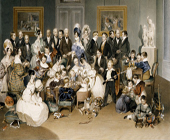Passengers, customers or whatever you want to call them are welcome to ride in the New York City transport system. Just don’t call them ladies or gentlemen. The city’s Metropolitan Transit Authority has outlawed the expression in yet another bizarre episode of the politically correct Culture War.
“Ladies and gentlemen” is not inclusive enough for the thought police patrolling the lines. Never mind that conductors have been doing this for a century. Never mind that the automatic announcement systems are programmed with the old courtesy formulas. Never mind that passengers might even like to be addressed in this manner.
All this must be changed immediately on buses, trains and stations. The MTA has ruled that conductors must now use new formulas that scrap the traditional “Ladies and gentlemen” suggesting “passengers” or “riders” as replacements. Conductors will be monitored by management for compliance. They must even manually override the automatic systems until new recordings can be made. Thus has it been decreed, and let no one dare do the contrary.
The Little Things are the Culture
Some people might think these small changes are insignificant. Such things make no difference in our daily lives. However, things like this are indicative of what is wrong with America today. They change the culture because little things are the culture.
Whenever a revolution breaks out, there is always an attempt to change the little things. Curiously, revolutionaries always change the manner of addressing people. The French Revolution of 1789 quickly stripped people of their titles, however humble, and insisted that everyone be called “citizen.” The Russian Revolution in 1917 likewise made people equal by calling them “comrades.”
These were changes in the culture that indicated a shift in society’s way of understanding people. They were tiny alterations forced upon the people, and that promoted an ideological agenda. During these revolutions, the neutered terms of address signaled that everyone was completely equal in everything, including intelligence, ability and talents. Using “comrade” signaled to all that the person was part of the communist tyranny that leveled society and controlled all aspects of life.
A Postmodern Diktat
Suppressing ladies and gentlemen has a particular postmodern overtone. “Citizen “and “comrade” at least identified people as something permanent. The new designation of “passenger” or “rider” resists a permanent condition and merely describes someone’s temporary state.
It fits well with the postmodern ambiguity that blurs all distinctions and hates all definitions. People are what they decide to be at the moment. People are encouraged to self-identify as what they perceive themselves to be. It is not a coincidence that the suppressed terms were changed because they were not inclusive of “transgendered” passengers who did not feel comfortable being defined by our God-given male-female binary categories.
The train authority diktat is postmodernity at its worst. It reduces people to mere simulacra (to use their term) in which everything becomes insubstantial forms or semblances of something.
The Meaning of Ladies and Gentlemen
That is what is wrong with suppressing ladies and gentlemen. It strips people of their dignity. It takes away from both women and men all that is distinguished, honored, or worthy of respect.
When a woman was called a lady, it used to be a compliment. In accepting this title, the woman is held to the high standard of behaving like a lady that appreciates grace, modesty and beauty. It assumed a desire to be feminine and glory in those qualities that today are so neglected.
When a man was called a gentleman, it was also a compliment. It assumed a willingness to be held to high standards. Men were asked to overcome the more brutal part of their nature and display masculine gentleness that spoke of courtesy, consideration and protection—virtues that are now neglected.
When a group was addressed as ladies and gentlemen, it expressed a complementary and mutual respect between the two sexes. It had none of the class struggle overtones of feminist propaganda. Instead, it celebrated the differences between the two with ceremony and distinction.
This treatment is the fruit of Christian civilization. It was the Church that first recognized and elevated the dignity of men, but especially women who were so degraded in pagan lands and times. Christian morality created an atmosphere of charity, trust and respect that both harmonized and protected the sexes.
Return to Barbaric Ways
Thus, the seemingly-insignificant suppression of ladies and gentlemen on New York’s trains represents a giant step backward. It affirms that we need no longer behave like ladies and gentlemen but rather like whatever we want to be or happen to be at the moment.
We are free to revert to the barbaric ways of old. People are free to disrespect, harass and offend everyone equally bad. Other people become merely the instruments of our gratification.
The recent sexual harassment scandals should come as no surprise. They are the product of a rotten culture where people no longer treat those around them as ladies and gentlemen.
Why Ladies and Gentlemen Are Forbidden on New York Trains

